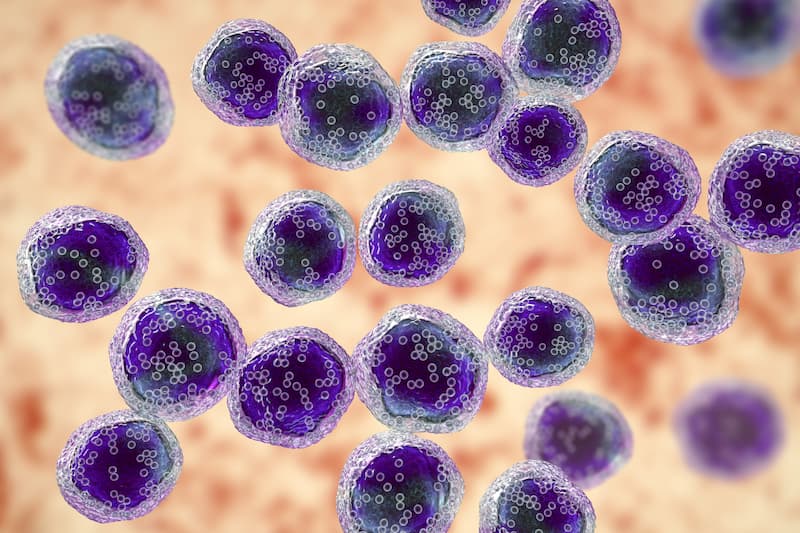BLA Accepted for Tabelecleucel in EBV+ Lymphoproliferative Disease
The drug developers of tabelecleucel are seeking approval of the treatment for patients with EBV-positive post-transplant lymphoproliferative disease.
The drug developers of tabelecleucel are seeking approval of the treatment for patients with EBV-positive post-transplant lymphoproliferative disease.

The FDA has accepted and given priority review to the filing of a biologics license application (BLA) for the allogeneic Epstein-Barr virus (EBV)-positive T-cell immunotherapy, tabelecleucel (tab-cel), for use in patients with EBV-positive post-transplant lymphoproliferative disease, according to a news release from the developer, Atara Biotherapeutics.1
Acceptance of the BLA for tab-cel comes from the global, multicenter, single-arm, open-label phase 3 ALLELE study (NCT03394365) showing a statistically significant 48.8% objective response rate and a favorable safety profile as compared with previous analyses.2
The Prescription Drug User Fee Act date is set for January 15, 2025.
"The acceptance of the tab-cel BLA is a significant milestone towards making this first-of-its-kind treatment available to patients in the US," Pascal Touchon, president and chief executive officer of Atara, said in a news release on the FDA BLA acceptance.1 "The FDA’s granting of priority review highlights the high unmet need in EBV+ PTLD, which is a devastating disease with limited treatment options and a poor overall survival rate.”
Of those initially screened from June 27, 2018, to November 5, 2021 (n = 63), 43 patients received at least 1 dose of tabelecleucel monotherapy. Patients were disaggregated into 2 groups based on prior hematopoietic stem-cell transplant (HSCT; n = 14) or solid organ transplant (SOT; n = 29). Across both groups, 2 x 106 cells/kg of tab-cel was administered intravenously on days 1, 8, and 15, with 35-day observation occurring after each cycle.
The post-transplant lymphoproliferative disease-adapted prognostic index assessed patients at baseline, where they were classified based on high-risk factors among age, ECOG performance status, and lactate dehydrogenase: no high-risk factors were considered low risk, 1 factor was considered intermediate risk, and 2 or 3 factors were considered high risk. After treatment completion or discontinuation, patients were assessed tri-monthly for up to 2 years and every 6 months for up to 5 years to assess survival. Radiographic assessments were conducted at screening, before cycles, at the safety follow-up visit, the quarterly follow-up, and at the 2-year study visit or early discontinuation.
The median number of monotherapy doses administered was 9 (IQR, 6-12) and 6 (3-9) in the HSCT and SOT groups, respectively, and 6 (3-12) overall. Additionally, median treatment duration was 2.8 months (IQR 1.9–4.3) and 1.9 months (0.5–3.4) in the HSCT and SOT groups and 2.1 months (0.5–3.9) overall. All patients received full monotherapy dosage without interruption, with 14 patients receiving subsequent treatment.
The primary end point was objective ORR. Secondary end points included duration of response (DOR), ORR in each group, time to best response, overall survival (OS), and safety.
In the HSCT group, 50% (95% CI, 23%-77%) had an objective response: best overall responses were a 43% complete response, a 7% partial response rate, a 21% stable disease rate, and a 14% progressive disease rate. The remaining 14% were not evaluable for response.
Median time to response was 1.0 months (IQR, 1.0-1.0), median follow-up was 14.1 months (IQR, 5.7-23.9), and median DOR was 23.0 months (95% CI, 15.9-not estimable [NE]). The estimated median OS was 11.0 months (95% CI, 2.0-NE).
In the SOT group, 52% (95% CI, 33%-71%) had an objective response: the best overall responses were a 21% complete response rate, 31% partial response rate, 7% stable disease rate, and a 24% progressive disease rate. The remaining 17% were not evaluable for response.
Median time to response was 1.1 months (IQR, 1.0-3.0), median follow-up was 6.0 months (IQR, 1.8-18.4), and median DOR was 15.2 months (95% CI, 1.2-NE). The estimated median OS was 5.7 months (95% CI, 1.8-NE).
The FDA has granted tab-cel orphan drug designation and breakthrough therapy designation for the treatment of rituximab (Rituxan)-refractory EBV-associated lymphoproliferative disease.
References
- Atara Biotherapeutics announces U.S. FDA acceptance and priority review of the Biologics License Application for tabelecleucel (tab-cel®) for the treatment of Epstein-Barr virus positive post-transplant lymphoproliferative disease. News Release. Published July 17, 2024. Accessed July 18, 2024. https://tinyurl.com/4h4wps4j
- Mahadeo KM, Baiocchi R, Beitinjaneh A, et al. Tabelecleucel for allogeneic haematopoietic stem-cell or solid organ transplant recipients with Epstein–Barr virus-positive post-transplant lymphoproliferative disease after failure of rituximab or rituximab and chemotherapy (ALLELE): a phase 3, multicentre, open-label trial. Lancet Oncol. 2024;25(3):376-387. doi:10.1016/S1470-2045(23)00649-6
Highlighting Insights From the Marginal Zone Lymphoma Workshop
Clinicians outline the significance of the MZL Workshop, where a gathering of international experts in the field discussed updates in the disease state.